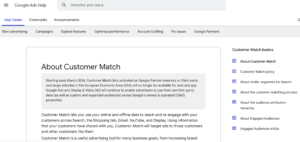Google recently announced an update to its Customer Match policy that will impact advertisers starting January 13, 2025. This change reflects Google’s commitment to enhancing user experience by tightening its policies around first-party data use. In particular, advertisers found repeatedly misusing Customer Match may face temporary or even permanent account suspensions. Below, we’ll walk you through the update, why it matters, and what steps you can take to ensure you’re compliant.
Understanding Google Ads’ Customer Match Policy Update
Customer Match is a feature within Google Ads that allows advertisers to use first-party data, like customer emails, to reach specific audiences across various campaigns on Google platforms. By matching this data with Google’s user profiles, advertisers can create highly targeted campaigns that drive relevance and value for both brands and users.
With the new policy update, Google is aiming to tighten its control over data practices that could negatively impact user experience. The key changes in the updated policy highlight how Google will respond to advertisers who misuse Customer Match, outlining stricter repercussions for non-compliance.

What’s New in the Policy?
Here are the main points of Google’s new Customer Match policy that advertisers should understand:
Stricter Enforcement of Misuse: Advertisers who engage in behavior that Google defines as misuse, such as data abuse or poor ad practices, may face temporary or permanent suspension from Customer Match.
User Experience Protections: The update emphasizes the need for advertisers to focus on positive user experiences. Any activity that risks user harm or degrades the quality of ads could lead to access restrictions.
Warnings Before Account Suspension: Google will provide a minimum of seven days’ notice before suspending an account for Customer Match policy violations. This grace period is intended to give advertisers a chance to address compliance issues.
These changes are set to take effect on January 13, 2025, and are designed to reinforce the trustworthiness and relevance of ads on Google’s platforms.
Why the Policy Update Matters to Advertisers
Customer Match is a powerful feature that enables brands to create targeted ads based on their customer data. However, with great power comes great responsibility. Google has historically been vigilant about preventing misuse of this feature, but the 2025 update represents a significant escalation in its approach.
Non-compliance could now mean more than a warning or a temporary restriction—advertisers who repeatedly violate the policy may face full account suspension, losing access to Customer Match and potentially other advertising tools within Google Ads. In other words, maintaining compliance is no longer optional; it’s essential.
For advertisers, this policy underscores the importance of ethical data practices and accountability in ad targeting. Focusing on transparent, user-consented data practices will not only ensure compliance but also build trust with audiences, ultimately leading to better campaign outcomes.
Staying Compliant with Google’s Customer Match Policy
To maintain access to Customer Match, advertisers should consider the following steps:
1. Secure User Consent
Before collecting any personal data, such as email addresses, ensure you have explicit consent from the user. Consent should be clear and straightforward, following privacy laws like GDPR and CCPA, which Google’s policy also reflects. Inform users exactly how their data will be used in advertising efforts, so there are no surprises.
2. Review Targeting Settings Carefully
When using Customer Match, advertisers must ensure they are not targeting sensitive or restricted audiences, including minors under the age of 18. Double-check audience settings and avoid segments that could lead to policy breaches, especially when promoting certain types of products.
3. Avoid Over-Personalization and Respect Privacy Boundaries
While Customer Match enables targeted advertising, over-personalization can quickly become invasive, potentially damaging user experience. Avoid ad content that’s overly specific or predictive, as it could trigger concerns about data privacy. Google monitors user feedback, and ads that receive excessive complaints may prompt a review of your account.
4. Educate Your Team on Policy Changes
Everyone involved in creating and managing Google Ads campaigns should understand the nuances of Customer Match and the importance of compliance. Regular team training sessions and policy updates can help ensure that all members are up to date with Google’s guidelines and best practices.
5. Monitor User Feedback & Ad Performance
Google actively considers user feedback when reviewing potential policy violations. Negative feedback, such as users flagging ads as misleading or irrelevant, could indicate that changes are needed in your ad targeting or messaging. Regularly monitor your ads’ performance and respond quickly to any signs of poor user experience.
Steps Google Is Taking to Enforce the New Policy
In its notification to advertisers, Google outlined how it would enforce the updated policy:
Warnings for Initial Violations: Google plans to issue warnings before taking severe actions, giving advertisers a grace period to correct any issues.
User Feedback as a Compliance Metric: Advertisers whose ads receive negative feedback are more likely to be reviewed for potential policy violations. This feedback-driven approach incentivizes brands to prioritize user experience.
Severity of Abuse Considered: Google will evaluate the severity of Customer Match policy abuse, with repeated or severe violations triggering stricter penalties. Advertisers should view this as a “three-strike” warning, where each violation could bring them closer to suspension.
The Risks of Non-Compliance: What Advertisers Stand to Lose
Non-compliance with the updated policy carries considerable risk. The most immediate consequence for repeated misuse of Customer Match is the loss of access to this feature, which can severely impact your targeting and campaign effectiveness. However, Google may go further, potentially suspending the entire ad account if the violations are severe or recurring.
Such a suspension can disrupt not only your Google Ads campaigns but also your overall digital marketing strategy. Brands that rely on Google Ads for driving website traffic, increasing conversions, or building awareness could experience significant setbacks.
Moving Forward: Adapting to Google’s Customer Match Policy Changes
For advertisers who rely on Customer Match as a central strategy, this policy update should serve as a wake-up call to review data practices and align them with Google’s standards. Staying compliant will require effort, but the benefits of maintaining access to Customer Match far outweigh the risks.
Key Actions to Take Right Now
Conduct a Data Collection Audit: Review how you gather user data to ensure it aligns with Google’s privacy and consent requirements.
Implement Data Security Measures: Make sure that user data used in Customer Match is securely stored and protected from misuse.
Establish a Compliance Review Process: Regularly check your Customer Match practices and ads to make sure they are compliant with both Google’s policies and any relevant privacy laws.
Optimize Ad Relevance and Quality: Focus on creating ads that add value to users. Prioritize quality over quantity to prevent negative user feedback and potential violations.
Final Thoughts
The updated Customer Match policy is a clear indication that Google is prioritizing user experience across its advertising ecosystem. By enforcing stricter rules on data usage and ad quality, Google aims to ensure that advertisers engage users ethically and transparently. While the changes may require some adjustments, advertisers who prioritize compliance and user satisfaction will benefit from the lasting advantages of targeted, effective advertising.
As January 2025 approaches, take time to review your current practices and make necessary adjustments to ensure a seamless transition. Compliance isn’t just about following the rules—it’s about building a relationship of trust with your audience and securing your brand’s long-term success in Google Ads.
About The Author
Jana Legaspi
Jana Legaspi is a seasoned content creator, blogger, and PR specialist with over 5 years of experience in the multimedia field. With a sharp eye for detail and a passion for storytelling, Jana has successfully crafted engaging content across various platforms, from social media to websites and beyond. Her diverse skill set allows her to seamlessly navigate the ever-changing digital landscape, consistently delivering quality content that resonates with audiences.




